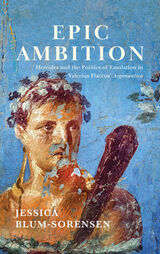
Focusing especially on Hercules, Blum-Sorensen explores how Valerius’ characters—and, by extension, their Roman audience—misinterpret exemplars of past achievement, or apply them to sad effect in changed circumstances. By reading such models as normative guides to epic triumph, Valerius’ Argonauts find themselves enacting tragic outcomes: effectively, the characters impose their nostalgic longing for epic triumph on the events before them, even as Valerius and his audience anticipate the tragedy awaiting his heroes. Valerius thus questions Rome’s reliance on the past as a guide to the present, allowing for doubt about the empire’s success under the new Flavian regime. It is the literary tradition’s exchange between triumphant epic and tragedy that makes the Argo’s voyage a perfect vehicle for Valerius’ exploration: the tensions between genres both raise and prohibit resolution of anxieties about how the new age—mythological or real—will turn out.

Spectacular verse drama.
Seneca is a figure of first importance in both Roman politics and literature: a leading adviser to Nero who attempted to restrain the emperor’s megalomania; a prolific moral philosopher; and the author of verse tragedies that strongly influenced Shakespeare and other Renaissance dramatists.
Seneca’s plays depict intense passions and interactions in rhetoric that is equally strong. Their perspective is much bleaker than that adopted in his prose writings. His plots are based on mythical episodes, in keeping with classical tradition. But the political realities of imperial Rome are also reflected in an obsessive concern with power and dominion over others. The Octavia is our sole surviving example of a Roman historical play; set at Nero’s court, it was probably written by an admirer of Seneca as statesman and dramatist.
John G. Fitch has thoroughly revised his two-volume edition of Seneca’s Tragedies to take account of the textual and interpretive scholarship that has appeared since its initial publication. His translation conveys the force of Seneca’s dramatic language and the lyric quality of his choral odes.

Spectacular verse drama.
Seneca is a figure of first importance in both Roman politics and literature: a leading adviser to Nero who attempted to restrain the emperor’s megalomania; a prolific moral philosopher; and the author of verse tragedies that strongly influenced Shakespeare and other Renaissance dramatists.
Seneca’s plays depict intense passions and interactions in rhetoric that is equally strong. Their perspective is much bleaker than that adopted in his prose writings. His plots are based on mythical episodes, in keeping with classical tradition. But the political realities of imperial Rome are also reflected in an obsessive concern with power and dominion over others. The Octavia is our sole surviving example of a Roman historical play; set at Nero’s court, it was probably written by an admirer of Seneca as statesman and dramatist.
John G. Fitch has thoroughly revised his two-volume edition of Seneca’s Tragedies to take account of the textual and interpretive scholarship that has appeared since its initial publication. His translation conveys the force of Seneca’s dramatic language and the lyric quality of his choral odes.

Seneca is a figure of first importance in both Roman politics and literature: a leading adviser to Nero who attempted to restrain the emperor's megalomania; a prolific moral philosopher; and the author of verse tragedies that strongly influenced Shakespeare and other Renaissance dramatists. This volume completes the Loeb Classical Library's new two-volume edition of Seneca's tragedies. John Fitch's annotated translation, which faces Latin text, conveys the force of Seneca's dramatic language and the lyric quality of his choral odes.
Seneca's plots are based on mythical episodes, in keeping with classical tradition. But the political realities of imperial Rome are also reflected here, in an obsessive concern with power and dominion over others. The "Octavia" is our sole surviving example of a Roman historical play; set at Nero's court, it was probably written by an admirer of Seneca as statesman and dramatist.
READERS
Browse our collection.
PUBLISHERS
See BiblioVault's publisher services.
STUDENT SERVICES
Files for college accessibility offices.
UChicago Accessibility Resources
home | accessibility | search | about | contact us
BiblioVault ® 2001 - 2024
The University of Chicago Press









